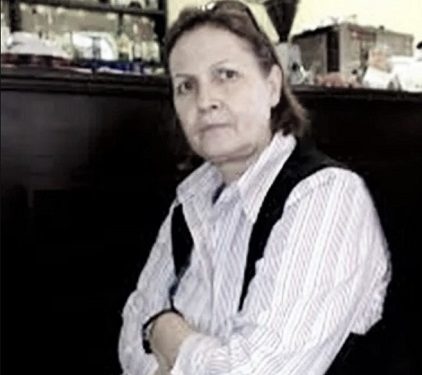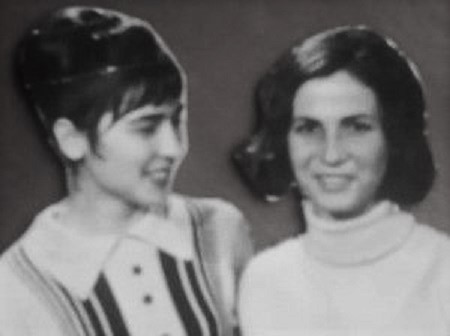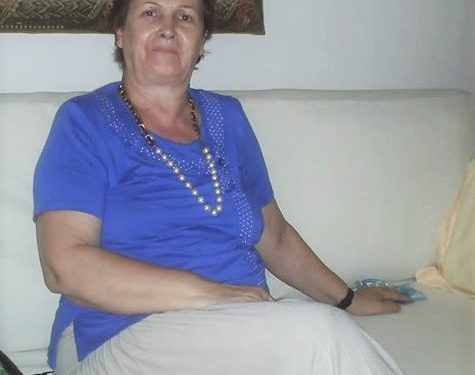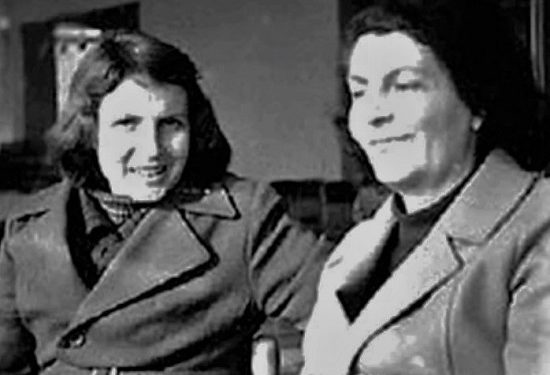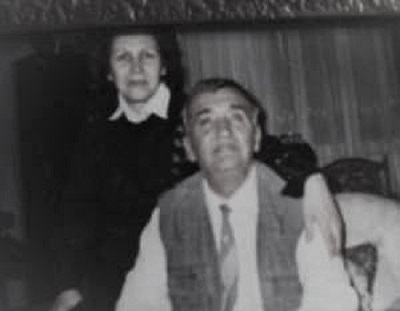From Blerina Goce
Memorie.al / A story of the former TVSH news anchor, who then became a filmmaker. Dressing as a “shield” from the “American imperialists” and how the group of Kinostudio “Alħbiria e Re” was saved from re-education, after the intervention of Dritëro Agolli…?! A study of Albanian filmmakers and series of documentaries about successful women in emigration. One of the first news anchors on Albanian Television, Angjelina Xhara, was only 12 years old when she participated in children’s shows. Then, in his second year in high school, he gave the news directly at 8:00 p.m., in what was known as the Evening Radio Magazine. But Xhara’s life was destined to pass after successive surprises.
In the second year at the University, in 1969, she gave the news as the first TVSH anchor, because Vera Zheji did not want to appear as a news anchor, so Angjelina appeared on the screen with Kiço Fotiadhi. Even today, she remembers with nostalgia this period, where she was next to great announcers.
But fate wanted him to break away from the television screen and go to Kinostudio, to be part of the first generation of filmmakers in Albania. For Xhara, this was a great fortune, regardless of how much he understood at the time…! A fate that would mark the whole future and continues to be her present too…!
With dozens of documentaries, they bear the name of Angjelina Xhara (Papalilo), while she continues to create, write and shoot various films. Finally, Xhara is dedicated to the female figure in a special way. He is in the process of writing a book about the women of Albanian cinematography, while he has also started to make a series of documentaries about Albanian women in emigration…!
Ms. Xhara, you are one of the first anchors of Albanian Television. How do you remember your first screen appearance as a news anchor?
I was an announcer at the Albanian Radio Television, for a long period of time, from the seventh grade, when I went to the children’s show. In my sophomore year in high school, I went on the Evening Radio Magazine at 8:00 p.m., it was a major news show. I was very young and I didn’t even know about politics.
I read the news automatically. But I had a good voice, I was a good student, they believed in me and allowed me to speak. Then at TVSH, I was chosen among the first announcers who spoke together with Kiço Fotiadhi. Then Violeta Kongo and Amalia Çala spoke, two very talented girls, and then, when I ran away from VATS, it was Tefta Radi.
Do you remember what you wore on that first screen appearance?
When I started the news on television, they made me a strange dress…! I was 20 years old, very young, when I saw that the dress was made of black tulle…! Of course, with a white interior. I wore it very little and used my outfit… and you know what?! A camel dress, light gray, with a white striped bolero, which came to me from a package from my mother’s aunt from America. While we were insulting the American imperialists, I had that outfit as a shield. A bit confused to believe but I tell you my true feeling…!
You remember with nostalgia the period spent in VATS. Why did you break away from there?
I was appointed to Kinostudio, together with Vllasova Musta, who I had as a friend and companion at Kinostudio. We supported each other. First I was an editor at Kinostudio, then a screenwriter and I also worked for the Ministry of Culture for cinematography, as the head of cinematography. Democracy found me privileged.
Suddenly, from a kind of uncertainty that I had related to my biography, which now does not seem important to me, I say that my appointment at Kinostudio was a great luck. At VAT, I would have been squeezed like a lemon and I would not have been able to make those beautiful films, which I have made and make. I thank God and the people, who suddenly assigned me to this place.
What do you remember from the past years at Kinostudio?
I want to remember Kristaq Dhamon, a wonderful artistic director of Kinostudio. There was no documentary film that was not made without his wish. I also want to remember Endri Keko, but not only. A bit hasty and immature, I once received an article in “Zeri i Populli” and wrote a script about a mother who had 12 children and welcomed the 13th. Endri told me: “Angelina, the documentary is never made based on the newspaper.” You can take the act, but put it there, in the place, where it happens. We went to Vlora and it was a beautiful film, except for the text, which I regret now, because the text then had a very big ideology.
How much have you felt the weight of this ideology on your shoulders? Were there times when you actually suffered because of it?
At Kinostudio, once a measure was taken to take us six months for re-education. A documentary was made about the “Enver” Plant and there appeared the portrait of Fiqrete Shehu, at a time when she was declared an “enemy of the Party”. Even the chairman of the League of Writers, Dritëro Agolli, intervened and saved the entire film group, without the decision being implemented, because the film had not yet been released in the city’s cinemas.
Or I remember when I was assigned to a creative team for a documentary, about war against religion. I have been and am a person who believes a lot in God, because this is how my good mother taught me. But I made the film because that was the time. The atmosphere at Kinostudio was inspiring, however, on certain topics. The artists themselves had self-censorship, because they had seen where those who thought differently, from the socialist general, ended up.
You have produced dozens of documentary films and published books: a monograph on Margarita Xhepa, a novel of your own, a volume of poetry… Finally, it seems that you have devoted yourself to the female figure, in books and in film. Why?
Because I am a woman myself, I was excited by the idea of how the female gender has unfolded with its personality in all fields of creativity in the films shot by the Kinostudio “New Albania”, and for this I have done a complete study. This study was carried out at the beginning of democracy, but I say that now I have to review it to fill it with new things, with new phenomena, new personalities, with new expressions of creative artistic individualities in the cinematography these last two decades as well.
It is voluminous, tiring, long work and I say that, although there are these difficulties, it must be done, because this is also a thank you for this whole creative group of women. I want to emphasize that; I have a passion for the movie, and then the book. The book is easier, because you are alone with yourself and the publisher, while the film is a collective art, where you have to deal with several creators. Usually, I wrote the script of the films, but now I have also gone to the direction.
Can you name some of the filmmakers who will be a major part of this study?
One of the main figures is Xhanfize Keko, the famous director of children’s films. She is the main figure in this publication, which will be made, not simply because she is a woman who tried to compete and competed very successfully with the male gender, but above all, there was a very large and beautiful concentration. She had a discovery within herself. It didn’t spread to different things. Initially, she started her life as a ticket seller in a cinema, very much in love with movies.
Then, after studying in the former Soviet Union, where she met director Endri Keko, her life was forever channeled, spiritually and creatively, into the genre of film. Her specialty was that she found the feature film for children. There it became incomparable, inalienable. Since I have most of my creativity in the other regime, I say to highlight the most outstanding things, the biggest results that women have achieved at that time, plus in the transition period.
But, although the only one in the artistic genre, apart from Keko, there has been other female directors and screenwriters…?
After Xhanfize Keko, I think that the woman has been presented with dignity in the documentary film, as a director. I will deal with the main figures of women, such as: Adriana Elini, Vitori Çeli, Marianthi Xhako, Donika Muçi, figures who were identified with works of high artistic level. There were works that are found in the golden fund of Albanian documentary.
But also with screenwriters, such as: Natasha Lako or Vasllova Musta. A place will also be occupied by female actresses, in the feature film. They are a fantastic creative output. Figures such as: Tinka Kurti, Margartita Xhepa, Drita Pelinku, Behije Çela, Marie Logoreci, Besa Imami, Roza Anagnosti, Marjeta Ljarja, Yllka Mujo, etc.
Women who have commitment and do not talk. It will not be just a count of their films, but they talk about emotional moments, how they felt in particular moments from their creativity, related to the film. Let’s take it; Marjeta Ljarja, married Rikardi when the movie “There is life in the snowy forests” was being filmed. There will be some “revelations”, although we call personal things a bit taboo. I will try to tease things that are of interest on the personal side as well, with a little more courage, to show the artistic life, to be free, that in the end they are part of life.
Most of these creative women you were friends with, who would you single out?
I want to say that we had a fantastic relationship at Kinostudio, that inspired a lot and it is precisely the result of this creative atmosphere that those films came that can be carefully reproduced and in our day and age, cannot be easily competed with. I had friends and I have pictures with them.
I have them in my memory drawer. Vitori Çeli, for example, told me: “Angelina, don’t get tired of constantly asking for special things.” The film is enough of an artistic find. That finding will keep him from the dramaturgical side. Then, the rest will be history, you can’t avoid it”. We made the film together, which won an award at the Film Festival, “Prof. Dr. Aleksandr Xhuvani”.
I had Adriana Elini as a very close, dear and indisputable friend. With him I felt very free; I didn’t have the stress of work. Together with him and Agime Fortuzin, we made “Our Carpets”.
We went to the middle of the mountains of Kurveles, to shoot, and I remember that we also had the bust of “Karadak” with us. I was behind and carrying the torso with me. Agimja told me: “You will see how the sheep are sheared and we will eat roasted meat.” The dogs, when we went there, were sheared and I didn’t eat roasted meat, but I was satisfied with the simplicity of life, the beauty of the reception of the simple people there, we shot what we could.
You didn’t go to film school, did you? How did you learn the profession?
We learned the film at the “New Albania” Kinostudio, it was a great vocational training school. Those who had learned professions abroad were very few. For example, only Marianthi Xhako had learned the profession of director and taught it to others. I have several films with him, successful collaborations as a director and I as a screenwriter, for example for the revolution of 24.
Meanwhile, you have lived for several years in emigration and you are also making a series of documentary films about successful immigrant women…?
I don’t know how I will choose the issue of financing some films, but I have the scripts ready for some prominent figures in the diaspora. For example, when I shot in New York, I met two amazing women. One was from the past, persecuted, tired of life. He had tried the bitter things of life.
She was one of the first Albanian film actresses and was put in prison, she had the bitter story of her life. He got out of prison, finally broke away from artistic life and spent the last years in the USA, in the country where man is free, gets what he deserves, in a fantastic country that respects human rights.
There, at least, she ended her life near her beloved family members. She was also an actress in Italy, she did her schooling there. “Meeting at the lake” is her first film and it must be discussed with Italy to make this film. It is very beautiful, that her bride speaks with great adoration and wants to tell this story.
I started this cycle for women with the documentary film about Iliriana Sulkuqi, the emigration poet, where the emigrant’s tears come out the size of an ocean.
Her documentary film was made with Ilia Tërpini and the director was Kolec Traboini. Another character is Rozi Theohari, a woman with a special personality, who, although her beginnings were in Albania, in 20 years in the USA, she broke through with a fantastic personality in creativity, with novels and books, with her way of communication./Memorie.al




